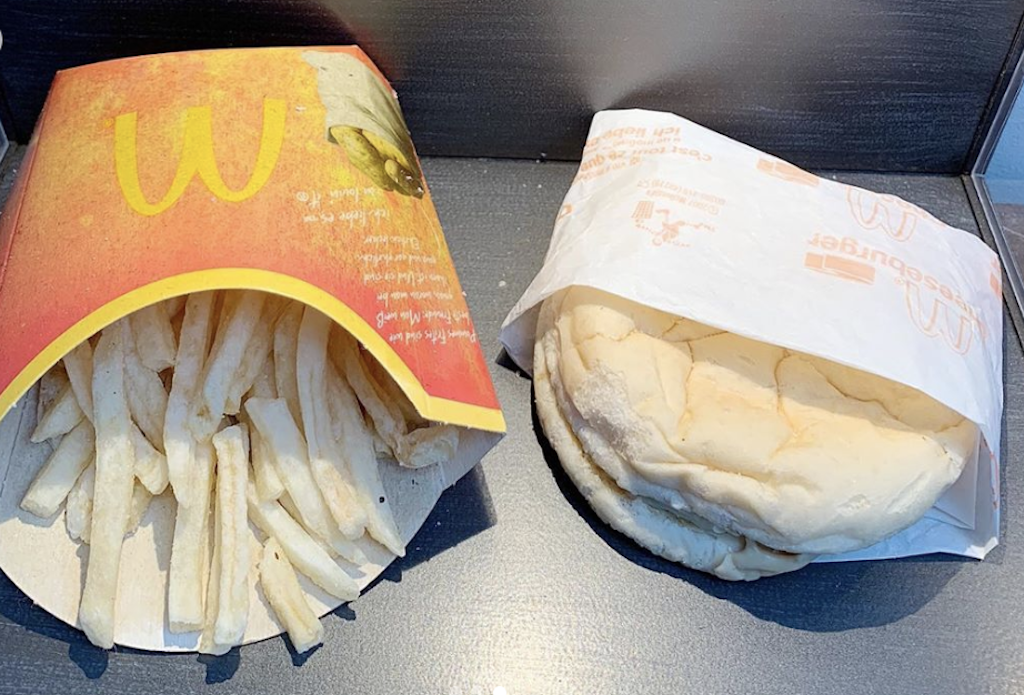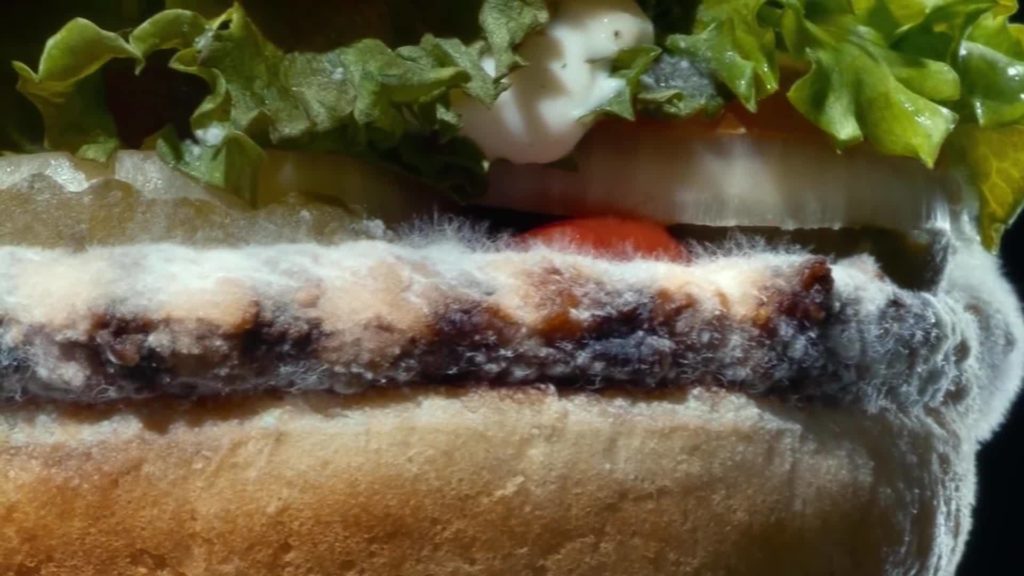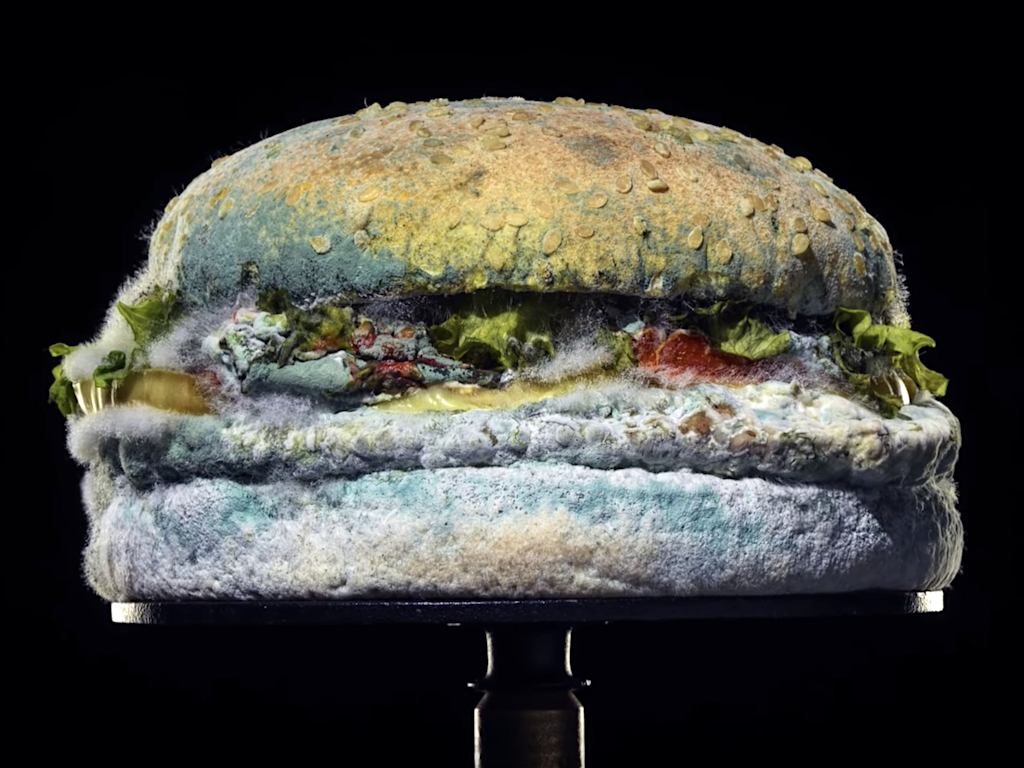4 Mins Read
Burger King recently announced that the company is removing preservatives from its Whoppers – and debuted an ad featuring a 34-day old disgustingly moldy burger ad just to prove it. To the joy of the fast food chain’s genius marketers, “The Moldy Whopper” ad quickly went viral online, garnering both praise and criticism, though mainly semi-amused befuddlement. But while Burger King may indeed be taking preservatives off its ingredient list, its Whopper is far from the “healthy” and “natural” meal that the viral ad claims it is and consumers should probably steer clear from biting into another case of “nutrition-washing”.
On Wednesday, Burger King sent the internet wild with its brand new video ad displaying a 34-day time lapse of their whopper decaying to a vivid shade of greenish-blue. The aim of the controversial ad campaign was to highlight the fast food chain’s commitment to dropping all artificial preservatives, colourings and flavours, which it has already done across most locations in Europe and 400 locations in the United States.
The tagline of the video reads “the beauty of real food is that it gets ugly. that’s why we are rolling out a WHOPPER® that is free from artificial preservatives. isn’t it beautiful?”, followed by a trendy hashtag #NoArtificialPreservatives.
Fast food ad fanatics may recognise the creative ad as a clear on-brand dig at rival McDonalds, whose cheeseburger and fries combo have time and time again appeared to withstand any signs of decomposition. In fact, the seemingly mould-free burger and fries has been on display in a scary exhibition in Iceland since 2009.

Commenting on the preservative-free pledge the company has proudly showcased, Fernando Machado, CMO for Burger King’s parent corporation Restaurant Brands International said: “At Burger King, we believe that real food tastes better.”
But while the ad is a win for Burger King’s media attention – as the saying goes, all publicity is good publicity – it reveals the predatory and often misleading commercial strategies that food corporations use in an attempt to retain consumers. Recognising the fast-growing consumer awareness around health and interest in “natural” foods, the fast food industry is desperately trying to polish their shoes.
Last year, McDonald’s (perhaps still reeling from their never-decomposing burger) announced its switch from frozen to fresh beef for its Quarter Pounders, branding it as a move to encourage “healthier” and “less processed” foods. Apparently, it worked, with sales of McDonald’s burgers going up for the first time in 5 years.
Nutritionists have been keen to point out that just because McDonald’s patties won’t be frozen and Burger King has ditched food additives doesn’t make these fast food options any healthier. In response to American fast casual bakery chain Panera claiming they would no longer use dyes in their products in 2015, co-founder of nonprofit Center for Science in the Public Interest Michael Jacobson retorted: “If what you’re having is a 1,000-calorie panini with a day’s worth of sodium, food additives should be the least of your concern.”
In this most recent case of nutrition-washing by Burger King, the brand has still left unspecified which specific preservatives have been removed from the Whopper, only maintaining that more than 90% of the company’s food ingredients don’t have artificial preservatives, colourings or flavourings.
Dive into the nutritional profile of a typical Burger King whopper and you won’t exactly get a picture of “healthy” – with or without preservatives. According to their website, one whopper sandwich contains 39 grams of fat in total, with 2 grams being trans fat aka the type of fat that raises bad cholesterol levels while lowering the good kind, and that has been associated with increasing the risk of heart disease, stroke and type 2 diabetes. Just 2 grams of trans fat is considered the upper limit for an average 2,000-calorie diet.

A whopper also contains 690 milligrams of sodium, a level that is considered dangerous by most health experts. According to the Colorado State University Extension, foods containing 350 milligrams of sodium – so around half of what a whopper contains – are considered too much sodium and should be avoided whenever possible. In terms of sugar, a whopper comes with 14 grams, roughly the same as what’s in a medium chocolate-coated doughnut, according to the USDA.
Finally, always worth remembering that beef is one of the most carbon-intensive foods in the world. Animal agriculture is responsible for around 15% of global carbon emissions, with the majority of this percentage attributed to cattle farming. Aside from contributing greenhouse gases that drive our climate crisis, livestock farming has been associated with water contamination, topsoil degradation, deforestation and biodiversity loss as well as huge amounts of land and water wastage.
With the world on the verge of a global collapse brought on by climate-induced disasters that will bring on drought and food shortages combined with public health epidemics such as obesity and diabetes, misleading advertisements amounting to nothing more than nutrition-washing is fuelling, not easing the problem.
Lead image courtesy of Burger King.




